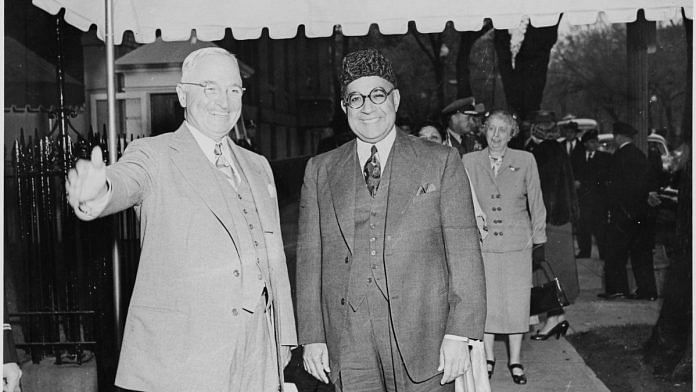On 16 October 1951, a large crowd gathered in Rawalpindi’s Company Bagh to listen to Pakistan’s first Prime Minister, Quaid-e-Millat Liaquat Ali Khan. After hearing the usual ‘laudatory’ compliments, Ali Khan stood up to address the crowd. As he waited for people to settle down, a man rose from the audience and stood in front of the dais; two loud bangs later, the ‘leader of the nation’ slumped to the ground.
Liaquat Ali Khan, one of the forerunners in the movement for Pakistan, was no more. His assailant, one Said Akbar, son of Babrak, an Afghan, was quickly pounced upon by the Prime Minister’s security forces and pummelled on the ground. Shots once again rang out from a gun, and the assailant, too, died. Ali Khan’s final moments, along with his assailant’s, were described vividly by MS Venkatramani in his book, The American Role in Pakistan.
Fifty-six years later, on 27 December 2007, Benazir Bhutto was killed under similar circumstances on the same grounds – since renamed Liaquat National Bagh in the Quaid-e-Millat’s honour.
Ali Khan was 56 at the time of his assassination. He was Pakistan’s first Prime Minister, first Minister of Defence, first Minister of Foreign Affairs and also the first Minister of Kashmir and Frontier Affairs.
Beginning of a long political career
Born in Karnal on 1 October 1895, Khan studied in Aligarh at the Muhammadan Anglo-Oriental College, the precursor to Aligarh Muslim University, before sailing to the United Kingdom in 1919. He studied at Oxford University, graduating with a degree in Jurisprudence in 1921. He then went to the Inner Temple, a professional association for barristers and judges in London, and was called to the Bar in 1922.
Ali Khan, however, never practised law and returned to British India, where his political career began in earnest. In 1926, he was elected to the United Provinces Provincial Legislative Council, representing Muzaffarnagar.
Kehkashan (galaxy), the white bungalow with manicured lawns, trees and iron grilles that the political stalwart once resided in, still stands in the Company Bagh area of Muzaffarnagar.
Kishwar Sultana, chairperson of the Department of History at the Allama Iqbal Open University, Pakistan notes that Ali Khan would remain in the provincial legislature, becoming the deputy president of the UP council in 1932. In the 1945 general election held in British India, he was elected to the Central Legislative Assembly from the Meerut constituency.
Long considered Jinnah’s ‘right-hand’, Ali Khan became the president of the Muslim League after the Quaid-e-Azam died in 1948 and also the president of Karachi’s constituent assembly.
His tenure as the head of Pakistan and its constituent assembly leaves two distinguishing legacies to the nature of the State and its foreign affairs position.
Also read:
The Objectives Resolution
During Ali Khan’s tenure as the head of the Constituent Assembly, he moved to pass the Objectives Resolution to the Constitution of Pakistan in 1949. The resolution was meant to outline the vision for Pakistan, but almost four decades later, in 1985, it was codified as law by former President Zia-ul-Haq. The Objectives Resolution was meant to be an aspirational document, not a substantive clause that could be enforced legally.
However, the Objectives Resolution proclaims Allah’s sovereignty over the universe, entrusting it to the Pakistani State under the condition that it be “exercised within the limits prescribed by Him”. The resolution envisions democracy, freedom, equality, tolerance and social justice as “enunciated by Islam” to be followed in the country while enabling Muslims the freedom to practise their faith as per the teachings and requirements of Islam.
Minority religions, according to the resolution, would be allowed to practise their faith only based on the provisions or rights given to them by the State. Ali Khan, during his opening remarks about the need for such a resolution, had said, “…the Frankenstein monster which human genius has produced in the form of scientific inventions, now threatens to destroy not only the fabric of human society but its material environment as well, the very habitat in which it dwells.”
Islam provides a panacea to the many diseases which have crept into the life of humanity today, he added. Ali Khan, thus, set the stage for future leaders of Pakistan to create a sectarian state.
Also read:
US and Soviet Union
Another enduring legacy of Ali Khan is with regard to Pakistan’s foreign policy. In his book, The United States and Pakistan 1947 – 2000: Disenchanted Allies, diplomat and author Dennis Kux highlights the one opportunity Ali Khan had to visit the Soviet Union in 1949.
“In mid-1949, Truman invited [Jawaharlal] Nehru to pay a state visit to the United States, the first by a South Asian leader. When Liaquat [Ali Khan] did not receive a similar invitation, his pride was hurt, and he felt snubbed,” writes Kux.
Months before the Partition had taken place, Jinnah had highlighted to US diplomats his interest in moving Islamabad (or then-capital Karachi) toward having closer ties with Washington DC, Kux notes in his book.
Despite Pakistan’s position vis-à-vis the US, Nehru was invited to visit Washington DC before Ali Khan.
In response to this snubbing, a Pakistani diplomat in Tehran was able to source an invitation from the USSR for Ali Khan to make a State visit, Kux notes in his book. On 7 June 1949, Ali Khan formally accepted the invitation. But the British High Commissioner in Karachi agitated and highlighted that such a visit would ‘create doubts’ in the minds of the British and Americans.
Eventually, the visit was cancelled, writes Kux.
Ali Khan’s longest-lasting legacy, perhaps, was in leaving behind the tools for Pakistan to look toward sectarianism as a central pillar of its governance rather than envisioning a truly secular future.
(Edited by Zoya Bhatti)



